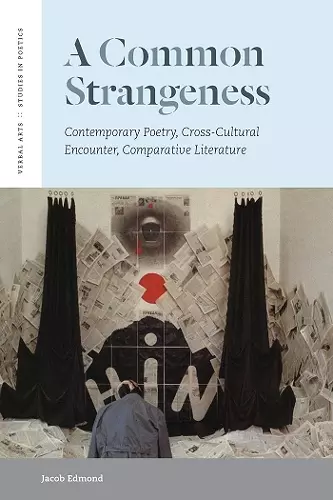A Common Strangeness
Contemporary Poetry, Cross-Cultural Encounter, Comparative Literature
Format:Paperback
Publisher:Fordham University Press
Published:1st Jun '12
Currently unavailable, and unfortunately no date known when it will be back
This paperback is available in another edition too:
- Hardback£65.00(9780823242597)

Tracks a shared concern with strangeness through which poets contested old binary oppositions as they re-emerged in new, post-Cold War forms
Examines poetic responses to the transition from the late Cold War period to the post-Cold War era of globalization, focusing on the work of Bei Dao and Yang Lian from China, Arkadii Dragomoshchenko and Dmitrii Prigov from Russia, and Charles Bernstein and Lyn Hejinian from the United States.
Why is our world still understood through binary oppositions—East and West, local and global, common and strange—that ought to have crumbled with the Berlin Wall? What might literary responses to the events that ushered in our era of globalization tell us about the rhetorical and historical underpinnings of these dichotomies?
In A Common Strangeness, Jacob Edmond exemplifies a new, multilingual and multilateral approach to literary and cultural studies. He begins with the entrance of China into multinational capitalism and the appearance of the Parisian flâneur in the writings of a Chinese poet exiled in Auckland, New Zealand. Moving among poetic examples in Russian, Chinese, and English, he then traces a series of encounters shaped by economic and geopolitical events from the Cultural Revolution, perestroika, and the June 4 massacre to the collapse of the Soviet Union, September 11, and the invasion of Iraq. In these encounters, Edmond tracks a shared concern with strangeness through which poets contested old binary oppositions as they reemerged in new, post-Cold War forms.
"This is an engaging and bold study, which combines skillful close reading with theoretical astuteness." -- Alexander K. Harrington, Durham University -The Russian Review "There is no doubt that A Common Strangeness, with its focal point in the aesthetic concept and device of estrangement, is a valuable contribution to recent scholarship that aims at finding new ways to look at the intricate network of relations of poetry to the world." -- -Cosima Bruno The China Quarterly "In this ambitious and rich work, Jacob Edmond explores the relationship between recent poetry and globalism. Rejecting both the traditional East/West binary and the local/global opposition which he sees as its replacement, Edmond maps out the middle ground- an area of contact and exchange in which seemingly disparate poets pursued a common poetics of strangeness in the post- Cold War years." -Slavic and East European Journal "The words transnational and globalization appear frequently within scholarship on contemporary poetry, but so far there have been few sustained attempts to narrate recent developments across more than two language-groups or geographical regions ... At least one person can now be said to fill the bill... Edmond shows himself to be thoroughly grounded in the relevant literary traditions, and whether a given poem is written in English, Russian, or Mandarin, he proves able to supply the kind of intensive, patient, erudite textual analysis that one associates with the Yale school back in its heyday." -- -Brian Reed Contemporary Literature "The strength of Edmond's study is the close readings of each poet, which are subtle and insightful across the broad range of national traditions he examines." --Joseph Acquisto in The Modern Language Review "In this superb study Jacob Edmond adeptly and convincingly unites the theory and practice of disparate writers seeking varying cultural philosophies of commonness and strangeness under the broad, all-encompassing umbrella of politics, literary theory, culture, art, and philosophy. His edifying investigation invites further avenues of inquiry." -Journal of Cold War Studies, MIT Press (Project Muse) "This book examines the changes in poetic discourses that have followed from the end of the Cold War and the rise of a global literature, and it engages with impressive competence in the fields of Chinese, American, and post-Soviet literary cultures... An understated, versatile, and clear exponent of poetic analysis and cultural commentary" --Andrew Kahn in the Slavic Review "This book is a remarkable accomplishment. It resists the fashionable solution to the problem it sets itself-it does not seek to dismantle the genre of the poem in deference to the authority of contexts." -Brian Glaser in symploke "Edmond's book offers a rich and thought-provoking study and stimulates comparatist research... the book offers an interesting juxtaposition of 'estranged' poets of various backgrounds and calls the reader's attention to important politically and culturally controversial trends in societies such as China, Russia, and the U.S. It opens up new research vistas by drawing scholarly attention to issues that have become increasingly important in the contemporary world where old oppositions are no longer operative" --Marina Grishakova and Mart Laanemets in Recherche litteraire / Literary
- Runner-up for Association for the Study of the Arts of the Present Book Prize 2013
- Commended for Harry Levin Prize 2013
ISBN: 9780823242603
Dimensions: unknown
Weight: unknown
284 pages